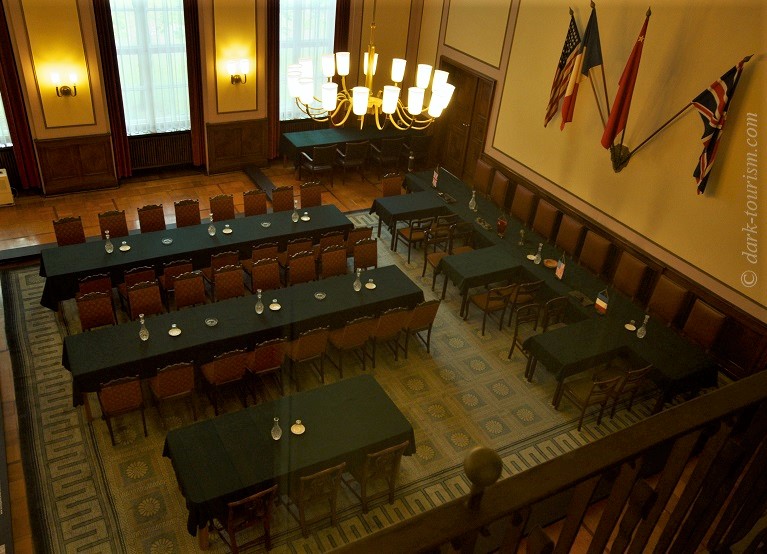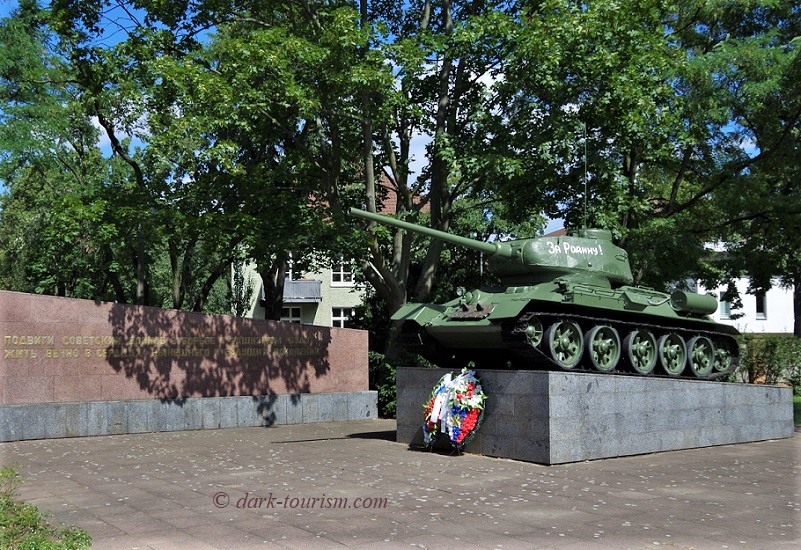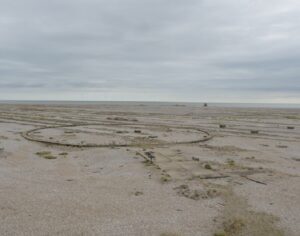Yesterday was VE Day (‘Victory in Europe’) in the West, i.e. the anniversary of the end of WWII, when Nazi Germany unconditionally surrendered to the Allies in a ceremony culminating in signing of the relevant documents in Berlin in 1945 on that day 78 years ago today … or not? In the East, the date of this celebratory day is a day later, i.e. today, on the 9th of May (if you don’t know why there is this date discrepancy, see here!).
Anyway, the day marking the end of the Great Patriotic War, as WWII is more commonly known in the former Eastern Bloc, has always been an important, almost “holy” day in the former USSR. Nowadays, Putin has more or less appropriated the date for his own propagandistic purposes (thus betraying its original significance to the real veterans of WWII, i.e. the liberators of Europe in 1945). I’m certain he will stage another one of those pompous parades on Red Square in Moscow today. But I’ll refuse to watch any of that.
Instead I would like to recommend to you this long feature and multiple interviews with Yuri Shevchuk (external link, opens in a new tab), recorded over a period of time last year. Shevchuck is the founder and frontman of the Russian rock band DDT, who had their origins in the 1980s dissident culture in the Soviet Union. Now, over 40 years on, they are THE veterans of Russian rock and still very political. (You may not have heard much of them in the West, partly because they had never any ambitions of “making it” in the West, instead staying resolutely and authentically Russian, but they are HUGE at home!)
In fact Shevchuk is one of Russia’s most outspoken critics of Putin and his crazy war in Ukraine. In the interviews he talks a lot about that and also about the way even this formerly celebratory date has been bulldozed over by Putin’s sledgehammer propaganda machine.
Unlike most other critical voices in Russia’s now much depleted cultural scene, DDT remain in Russia and refuse to flee into exile (these days they’re based in St Petersburg, which is at least the country’s most liberal city). That outspokenness obviously comes with its risks (Shevchuk has already had a couple of court orders for allegedly “defaming” the Russian Armed Forces, even if he didn’t even reference the military). Yet DDT still play the occasional gig wherever the repressive situation allows for it (i.e. not many – and according to DDT’s own website currently all gig dates are “postponed”).
If you want a glimpse into the real Russia beyond Putin, the war and and media propaganda overkill, you really could do worse than watching this illuminating feature (same external link). It’s not just for Russianists, by the way. There are English subtitles too (not always perfect, and sometimes missing during lyrics/poetry recitals, but good enough for anybody to follow the interviews and the points being made in them).
Shevchuk and DDT have also released two anti-war protest songs since February last year, and this one (another external link, also opens in a new tab) has become something of an anti-war anthem for me and my wife in recent months. It’s called (transliterated) ‘Rodina, Vernis Domoy’, meaning “Motherland, Come Home”. It’s beautiful and haunting. And the video isn’t bad either (and here’s a webpage that has the lyrics with an English translation – another external link to open in a new tab).
Why am I posting all this? I want a counterpoint to all that blanket anti-Russian-ness that has so taken such a foothold in the West. I said it at the beginning of this tragedy and I’m saying it again: Putin is NOT Russia. Ordinary Russians don’t want this war – even if too many are blinded by the propaganda and vaguely say they support it when asked in the streets in Moscow (it’s just safer to do so). But honesty and the truth are extremely hard to come by these days in Russia so it’s not easy to know what people really think. None of the Russians I know (with one sad exception early on) are in favour of this war. And Shevchuk more or less claims the same for DDT’s very large fan base. But under the dictatorial repressions of Putin’s regime, many people prefer to keep their head down, get on with their everyday lives and pretend the war isn’t happening (at least until a relative, son, husband or boyfriend comes home in a body bag). It’s a very Russian approach, already all too familiar from the times of the Afghan and Chechen wars. Shevchuck has a lot to say about that angle too, by the way. And he’s a rare rock of open honesty in the sea of silence and pretence gripping Russia so tightly at the moment …
Back to that automatic anti-Russian-ness in the West I mentioned and which I find is as exaggerated as it is wrong. Here’s a telling example: the German-Russian Museum in Berlin, an eminent and unique institution at the very original site where exactly 78 years ago today, the Nazis’ surrender was signed. Here’s a photo of the original site, the core part of the museum, its “holy of holies” – the ‘surrender hall’:

Then, at the beginning of the Ukraine invasion last year the museum’s management quickly decided to rename the museum, eliminating the word “Russian” and instead calling itself simply “Museum Berlin-Karlshorst”. Now nothing in its name even indicates what the museum is about or hints at its immense historical significance. OK, you don’t see the “dirty word” Russian any more. But unless you know better you’d now think it’s just a little local district museum that you’d probably give a miss unless you’re a local resident. I really think this sort of verbal iconoclasm and self-censorship is counterproductive.
By the way – the photo at the top of this post (taken in 2016) shows the T-34 tank on a plinth outside the ex-German-Russian Museum. It’s a classic type of war memorial monument that you find thousands of all over the former Eastern Bloc (except in places where all such Soviet traces have been eliminated, as presumably is the case now in Ukraine).
At the same time as I can’t join in the undifferentiated bashing of all things Russian you see in the West these days, I’m also not buying into all that (self-)glorification of the Ukrainian side, full of hyperbole and absolutes that make me similarly uncomfortable. Hence I’m also refusing to join in the chorus of “Slava Ukraina”, or ‘glory to Ukraine’. “Glory” is not a concept I can relate to. For me it seems to imply some form of per se moral superiority, and I don’t think anybody has the right to assume that. I understand the Ukrainians’ use of it psychologically, as a morale booster or something, given what the country’s been going through for the past 15 months. But ultimately, on deeper consideration, I don’t find it sensible when you think about what it’s supposed to imply.
Maybe it’s for the same reason that I have trouble with the concept of ‘patriotism’ too. I never used to have a single patriotic bone in my body while I still lived in my home country of Germany (that was until 1996). It was only when I moved abroad and found myself having to defend Germany against unjustified prejudices that a tiny spark of something like patriotism showed itself in me. But that has long since levelled out. I don’t think anything real is gained by appealing to ‘patriotism’. What would really be lost if we dropped the concept altogether? “Look around, we’re all people – who needs countries anyway?”, Jello Biafra once sang (in the track “Stars and Stripes of Corruption” from 1985). Do you have a watertight answer to that question? I don’t.
Call me a naive, idealistic romantic, but I rather want equality, peace, reason and sensibility to prevail, for everybody and everywhere – and any automatic concept of superiority of one country over all others (i.e. ‘patriotism’) doesn’t fit in with that. And to be honest, when it comes to “glory” I don’t even fully understand what that’s really supposed to mean beyond some vague “better than thou” sentiment … But then again, I’ve never been in the military … maybe that’s why I can’t relate to such things … (Incidentally, I’m a certified “Wehrdienstverweigerer”, or ‘conscientious objector’, a status I fought for and won in a court case against my own nation state – so don’t expect me to be lenient on state-imposed patriotism, esp. in a military sense.)
But back to today’s date. It will largely pass me by. Since my return from Northern Ireland and Birmingham under less than ideal conditions (DT Newsletter readers will know what I’m referring to) a few weeks ago, I haven’t watched a single minute of TV. I do briefly check the news online every morning, but otherwise I’m not currently following the media much. Maybe it’s because I got tired of them or may it’s just because I have more important things closer to home to deal with right now. I don’t know. I just never feel like turning “the box” (slab, more like, these days) on at all.
So today is an important historical date, but I don’t feel like celebrating. It just doesn’t seem appropriate given the situation in Ukraine, Russia and the world.
And there’s another, personal reason: 9 May would have been my Dad’s birthday. He passed away in March 2020 at the very beginning of the Covid-19 pandemic. So today’s date has for me lost its celebratory sheen for that reason as well.
But for everybody else: Happy Victory Day …





One Response
Russia becoming a “cultural wasteland”, as more and more artists and critics leave the country, is also the topic of this readable article …